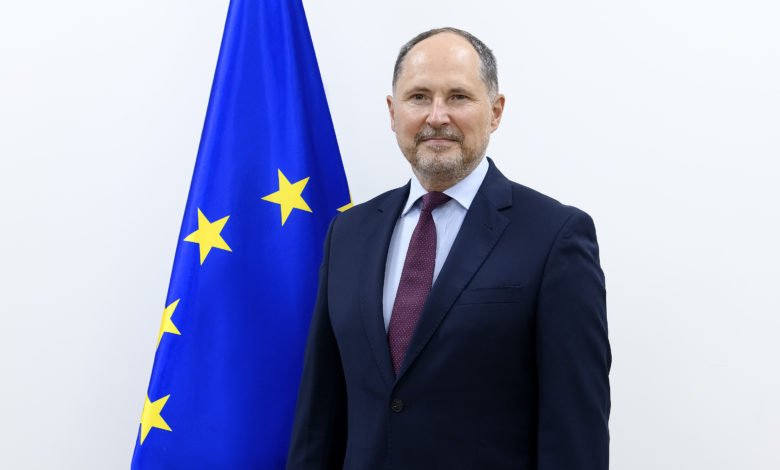
Ambassador Herczynski on EU Recommendations, Deoligarchization, Anti-EU Narrative
Ambassador Pawel Herczynski, the new Head of the European Union Delegation to Georgia, sat down for an interview with Interpressnews agency and said inclusive process is the key for fulfilling the twelve recommendations that the Council of the European Union set for Georgia to attain the candidacy. He also said the allegations about the attempts by “external forces” to drag Georgia into war are “rubbish”.
- European Commission’s Memo Detailing Recommendations for Georgia
- Conditions First, Candidate Status After – EU Commission Recommends on Georgia
Inclusivity in fulfilling EU recommendations
Speaking about the need for Georgia to fulfill the EU recommendations, Ambassador Herczynski noted that although the government has “a very ambitious plan” to implement 12 conditions, “it is for everyone across the political lines to build bridges and to work constructively in order to make progress in those 12 areas”.
In this context, the Ambassador noted that the government needs to ensure inclusivity, while the opposition needs to maintain a constructive approach. “The opposition needs to work together with the government to make sure that the progress is made,” he stressed.
- Part of Opposition Starts Parallel Working Process on EU Recommendations
- Georgian Dream Unveils Plan to Meet EU Recommendations
Ambassador Herczynski said that the process should involve all stakeholders, while the government should take into consideration the opinions by OSCE/ODIHR – an election watchdog – and the CoE/Venice Commission, a constitutional watchdog.
He noted that Georgians should sit down together, “build the bridges and overcome all differences”, because, as he put it, this opportunity should be seized. “It would be really huge mistake if this opening given by the European Council, given by the leaders of the European Union, saying that Georgia has a European perspective, that Georgia is part of the European family, is wasted,” the Ambassador added.
“Deoligarchization”
Asked by the journalist how the country should fulfill the European Commission’s recommendation on Deoligarchization, the EU Ambassador responded that the issue is “very simple and this is not an issue that is only unique to Georgia.” “There are vested interests, and there is too much influence of business upon politics,” he noted.
“I think that having less influence of rich businessmen upon politics would strengthen Georgia, would attract foreign investment, would make sure that this country is attractive for prospective investors. It’s for Georgians to decide, and we sincerely hope that the progress will be made also when it comes to this issue,” the Ambassador said.
Asked whether the European Union is considering the issue of imposing sanctions on Bidzina Ivanishvili, founder of the ruling Georgian Dream party, the Ambassador emphasized that there are no names mentioned in the 12 recommendations. “We are talking about the process, but we are not mentioning any names,” he stressed.
“When it comes to the EU sanctions policy, our sanctions against Russia are the most robust ever. And those decisions taken by 27 states are based on unanimity, so all member states have to agree and of course this needs to be very well documented and very well founded,” Ambassador Herczynski noted.
Georgian Dream’s relations with Western partners
Asked about the criticism voiced by government officials against some MEPs, the EU Ambassador said that criticism is always healthy, but warned, “when you want to become a member of the European family, you are usually very careful about how you describe this family members.”
“Even during the last State of the Union speech of the President of the European Commission [Ursula von der Leyen] just two or three days ago, she mentioned that Georgia belongs to the European family. So, we are talking about Georgia trying to join the family. So, I hope that this will be the subject of the conversation. Georgia is trying to join the family of free, democratic, prosperous European countries,” he said.
“War Narrative” – rubbish
The EU Ambassador slammed the allegations about “external forces” trying to drag Georgia into war and to open the second front as “absurd” and “pure nonsense.”
“The European Union is a peace project. We have received a Nobel Peace Prize not long ago. So, these accusations are rubbish. I am sorry to be as blunt as possible”, he said.
The Ambassador also noted that the European Union has always been the strongest supporter of independence, sovereignty and territorial integrity of Georgia, adding that the EU Monitoring Mission to Georgia has been making sure for 14 years that “there is stability and there is progress when it comes to the breakaway regions.”
- New EU Ambassador Meets Prime Minister
- New EU Amb. Pawel Herczynski Meets President
- Foreign Minister Meets New EU Ambassador, Pawel Herczynski
This post is also available in: ქართული Русский